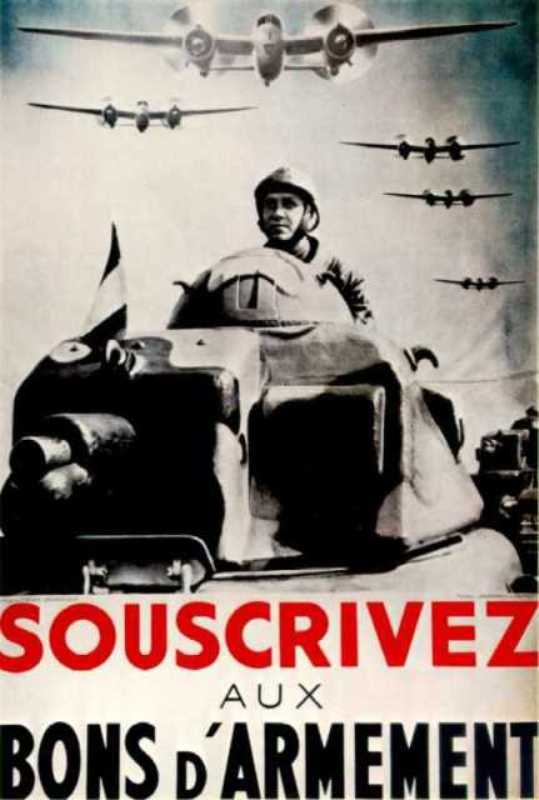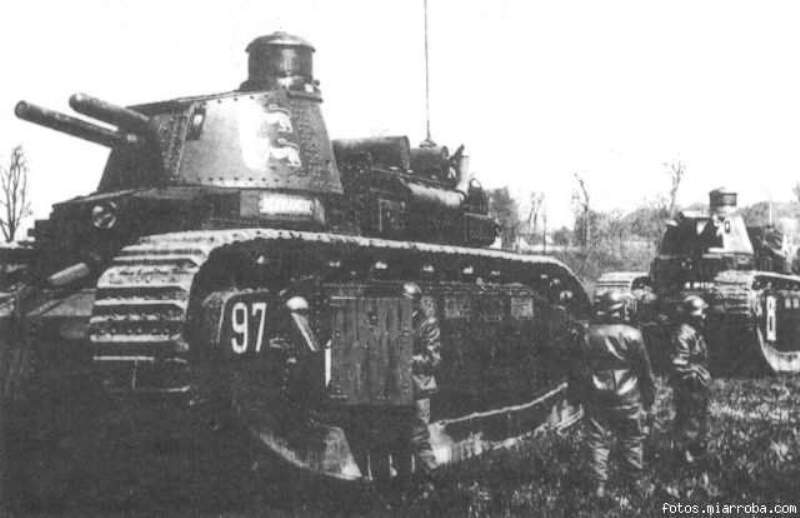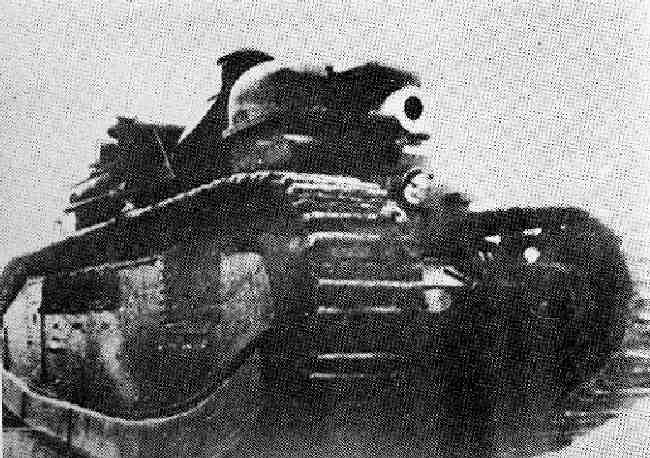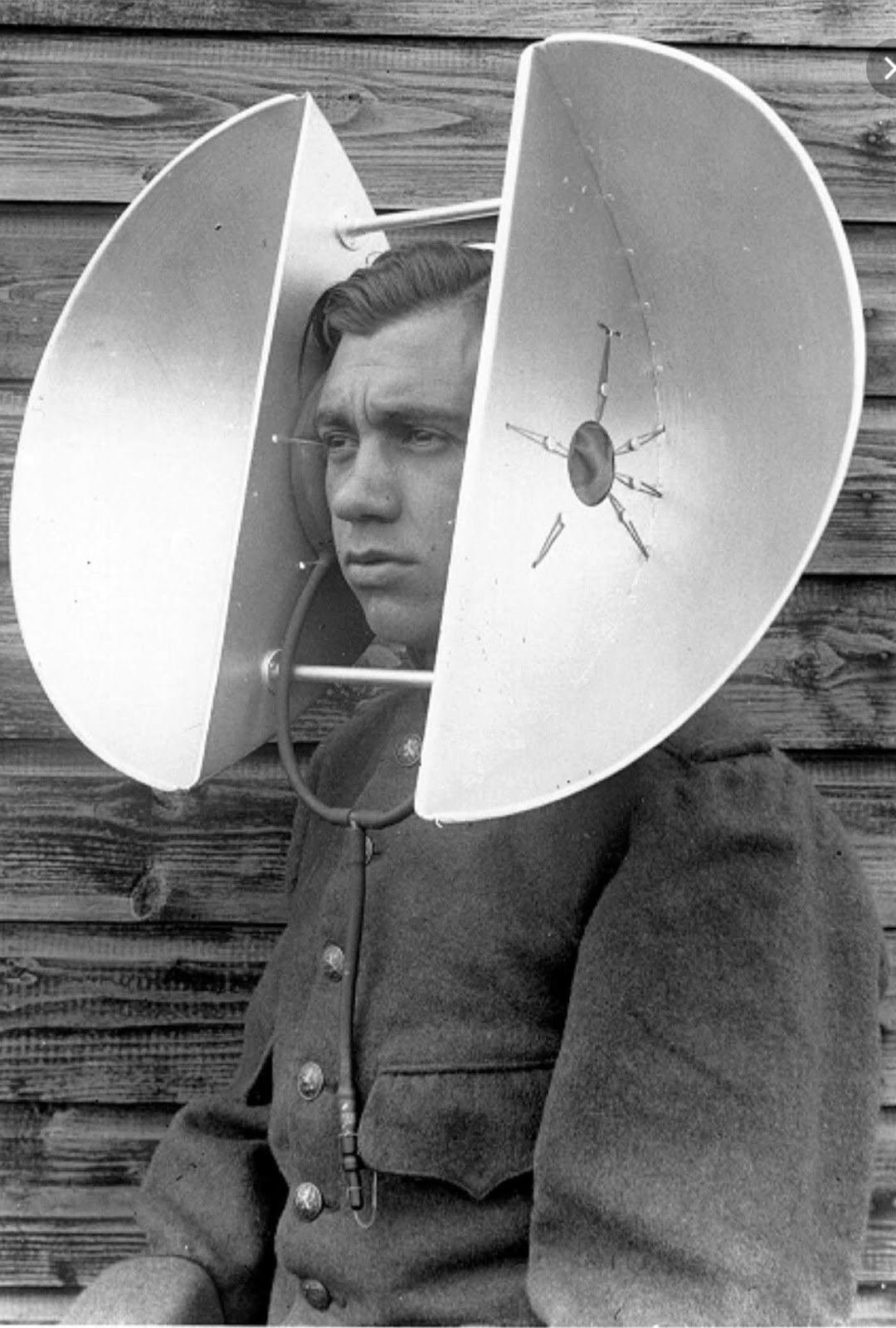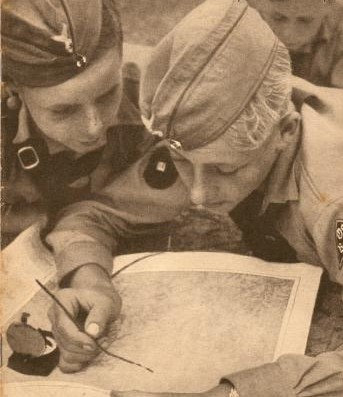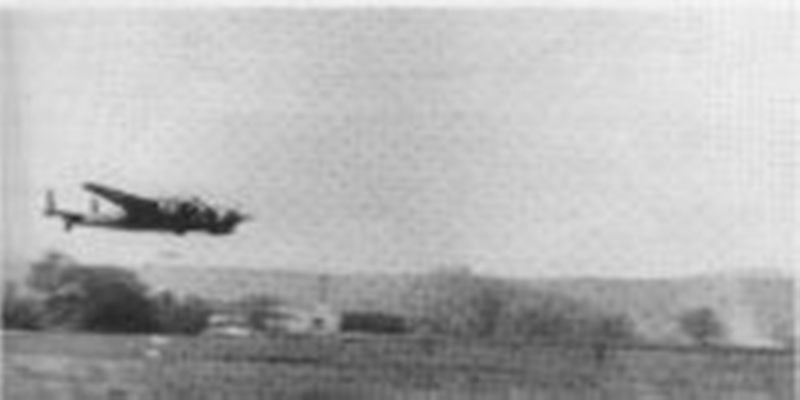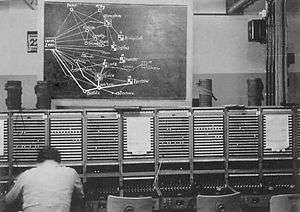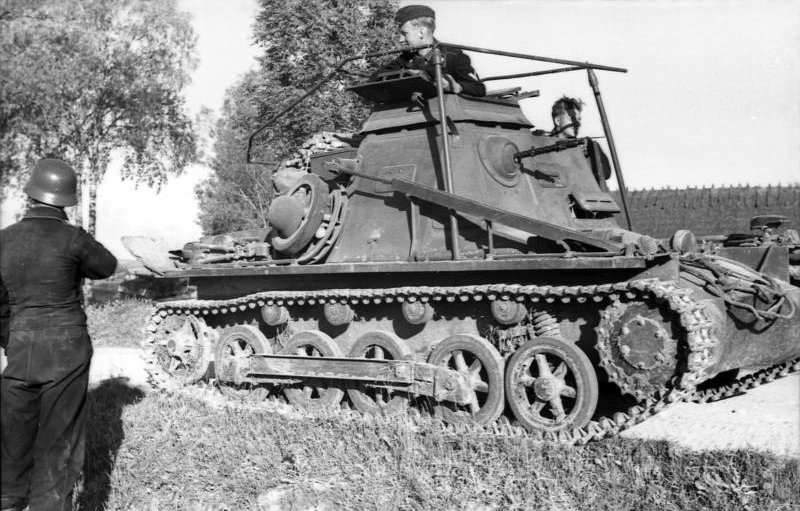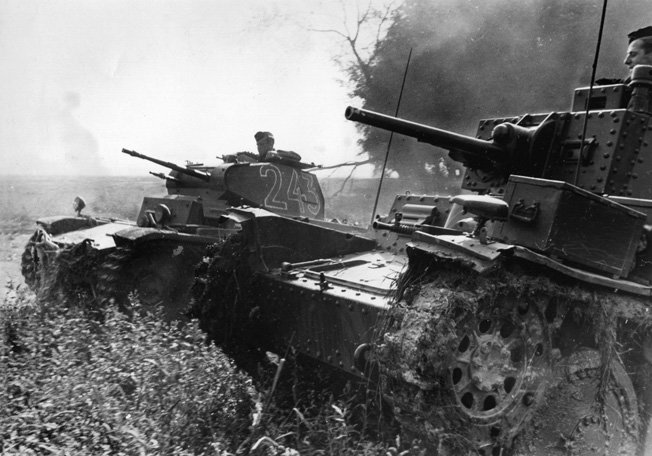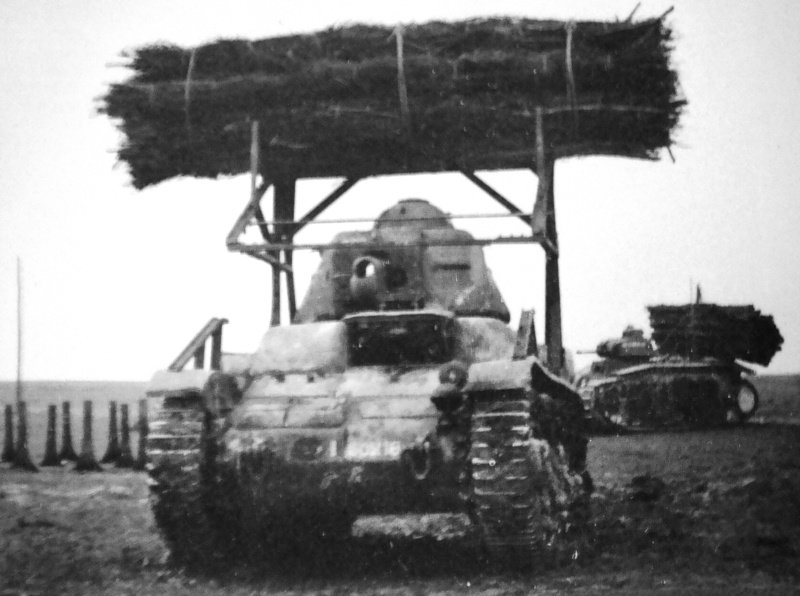CHAPTER 124 – GUERRE-ECLAIR
Nervos belli, pecuniam infinitam
A few kilometers off Forbach, september the 9th, an hour before dawn
With a shiver,
Maréchal-des-Logis Henri Bréville flicked away the remnants of his cigarette, watching it trace a glowing red arc against the cold night and hitting the massive hull of his tank in a flurry of sparks. Bréville felt tired and on edge. It had been a rough night for him and his 51st Tank Regiment comrades, double-checking their machines and bringing them to their assigned jump-off areas. Their 2C tanks were foul and temperamental beasts, known to the regiment’s tankers and mechanics alike as « the fat bastards ». The fat bastards were big as houses, but still felt cramped to their harrowed ten-man crew. The fat bastards were about as agile as Maginot Line bunkers with tracks, and creaked like an old pirate ship whenever one tried to manoeuvre them. Despite their two Maybach engines, the fat bastards moved only slightly faster than glaciers, and were known to be overtaken by infantry platoons running in full gear. The crews usually hated the fat bastards, for the massive beasts of war had a nasty way of sucking every bit of energy from the men who serviced them, exhausting the
mécanos and drowning their hapless crew in noise, fumes, and sometimes even water. But the fat bastards had an advantage: they were the heaviest tanks in the whole world, from New York to Moscow. Their every apparition in a parade or exercise was an event in itself, stunning spectators as well as other tankers. Riding in a Char 2C, let alone commandeering one, was akin to stardom among French
Cuirassiers.
Again, Bréville felt a shiver run up his spine, and he fidgeted. Was it cold? Was it nerves ? Or was it, more simply, fear? Half-consciously he pulled out his pack of
Gauloises de Troupes. Looking at the winged helmet on the pack, Bréville felt – stupidly, he knew – a little better. Surely, an army which thought of making special packs of cigarettes for soldiers would not let him down when push finally came to shove. Trying his best not to think about what particular form the shoving would take, Bréville turned away from the hull of his 2C and squinted to look north. From what he could hear, the night had brought the same terrors to the German soldiers manning the
Ligne Siegfried – and then some. Though dawn would not break till an hour at least, the horizon was flickering up. A low rumble rolled throughout the plain, as it had done for the past hour or so. When he focused, Bréville thought he could hear the French heavy artillery batteries, located behind the hill of L’Hôpital, firing salvo after salvo against the German positions.
“Some beating the poor sods are taking,
hein?” said Goubert, the tank radio, a few steps behind Bréville. Goubert’s gruff voice seemed to carry as much satisfaction as it did disgust.
Bréville grunted his agreement, as the French batteries let loose another volley of 155mm. He tried to imagine what it was like, being there, just a few kilometres away, at the receiving end of that artillery barrage. Almost immediately, he winced and decided it was best not to dwell on such matters – he certainly did not need to think of mangled corpses and lacerated bodies, not just minutes before an offensive. It was enough to know and appreciate the fact that, however rough his own night had felt, the Germans had it much worse. So far there had been no real counter-battery fire that he could see, but Bréville didn’t know whether it was a good sign or not. Despite of his 2C’s weight and reinforced front armor, Bréville harbored no illusion of his chances of surviving a barrage of German high-calibre fire. For all their intimidating mass, the 2Cs were not invincible, far from it. The
mécanos had enough trouble keeping them functional in peacetime.
French tankers from the 51ème Régiment de Chars de Combat
“Ah,
merde” said Goubert, turning west, squinting in his efforts to pierce through the darkness. “Here comes the brass. Sounds like the shit show is about to begin”
Over the low growl of the tank engines coming to life in the distance, a concert of shrill whistles, bugles and car horn shredded the night. A rapidly approaching automobile – a requisitioned civilian Peugeot hastily painted in khaki camouflage with its headlights reduced to a thin rectangle – was blaring its way towards the beginning of the tank column.
Standing at the back of the Peugeot, Major Christian de Castries, commanding officer of the 51st Tank Regiment, was shouting orders at each tank crew his car passed by as his chauffeur drove up the column of immobilised tanks. Next to the driver, a bugler sounded a cavalry charge – de Castries fancied himself a modern-day mounted knight, and refused to admit that his regiment of rolling pillboxes would already be hard pressed to keep up with a marching column of riflemen. The first tanks his car drove by were much lighter Hotchkiss types, though, three companies on loan from the
41ème Division Cuirassée Légère. The rest of the division would be held in reserve until a breach had been opened in the Germans’ “Siegfried Line”. The smaller machines were a hodgepodge of -35 and -38 models, most of which having seen action in Spain. Shaken into action by the bugle and the whistles of their platoon commanders, the Hotchkiss gunners/tank commanders pulled open their tank’s small turret hatch and slid their legs inside, sitting on the still-opened trap door. They’d button up their cramped Hotchkiss soon enough, and clearly wanted to enjoy some fresh air. Here and there one green Hotchkiss commander leaned on the side of his mount to throw up a bad case of battle nerves. As far as Bréville could, see the road was sparkling like a Christmas tree as flashlights sent quick Morse signals from tank to tank – only the H-38s were equipped with radios, and the colored flags used by H-35 tankers were of little use before sunrise. One by one, the tanks were firing up their engines, filling the early morning air with heavy exhaust fumes as de Castrie’s command car sped forward towards Bréville.
“Embark!” shouted de Castries as he passed the massive, dinosaur-like silhouettes of the tank regiment’s 2Cs.“Embark at once! Attack formation!”
One by one the 2C crews crushed their cigarettes underfoot and ran to the large armored door cut into the right side of their tanks. The tanks’ twin engines rumbled, and slowly the massive war beasts came into life, the ones further back spreading left and right of the road until the entire ten-tank regiment assumed a wide arrowhead formation. Bréville’s own tank,
Champagne, remained on the road as its crew waited for both wings of the formation to spread out before moving. The The
Champagne’s silhouette was stockier than the rest of the regiment’s machines: its turreted 75mm gun had been replaced by a very short 155 trench howitzer, an ugly trench weapon which snout gave the tank an even more primitive look than the rest of the regiment’s machines.
Champagne was supposed to provide the advancing 2Cs with mobile artillery support, crushing German bunkers and anti-tank positions as they moved across the
Westwall. Lighter positions would simply be run roughshod and crushed, something the 2C was definitely good at.
Char 2C 'Champagne' in its new appui-feu role.
And God help the unlucky Feldgrau who doesn’t vacate his machine-gun nest before a fat bastard’s seventy tons flatten it under its tracks, thought Bréville.
The radio sparked into life just as Bréville adjusted his helmet. The shitshow, as Goubert had said, was about to begin.
A hill near Wörth am Rhein, Rhineland, South-western Germany, September the 9th, 7:00 AM
Scattered around their leader, the Pimpf patrol had taken position on the knoll, half-hidden behind the grove of walnut trees and granite slabs that Tall Karl, the Patrol leader, had picked up as their observation post ten days before. For the past hour, the five boys – all of them in their mid-teens – had been searching the skies with their brand-new Zeiss binoculars. The binoculars had been handed to them the week before by a stern Luftwaffe
Unteroffizier which had impressed upon them their new responsibility: by decision of the Führer himself, all Pimpf members were now officially Luftwaffe auxiliaries, tasked with detecting enemy air activities, in particular bombing raids. They were to signal downed enemy aviators, as well as possible airborne operations nearby “essential State infrastructure”. For the members of Air Defence Auxiliary Patrol #54, that meant for the most part detection of French and British raids targeting the Luftwaffe base at Stuttgart-Nellingen, which housed both
Zerstörergeschwader 76’s heavy Messerschmidt fighters and some Heinkels of Bomber Wing 19 which hadn’t been transferred to Poland yet.
“I detect enemy planes, lots, coming from the west-southwest!” suddenly cried Peter Düssler. Contrary to his four comrades, Düssler had left his binoculars on the ground, still in their metal casing to protect them from the mud and rotting leaves. Instead, he was fiddling with the buttons on a small box, linked to what looked like a pair of giant, metallic ears he wore around his skull. Although he was neither as athletic as Tall Karl, or as courageous as Pfeiz, the younger member of the patrol, Düssler had been chosen for a vitally important task: operating the Dutch-made acoustic locator that had been provided to all air defence auxiliaries, and for which he was the only one properly trained in the patrol.
One of the Dutch-made portable locators acquired by the Luftwaffe as part of the Reich's effort to support the NSB government
“The sound is low and regular”, he said, lifting his head slightly to meet Karl’s interrogating gaze. “I say this is most probably a high-altitude raid!”
As one man, his four comrades trained their binoculars in the indicated direction, squinting as they tried to distinguish tiny bombers silhouettes against the morning clouds. Over the sounds of the forest, a low rumble could be heard, but, apart from Düssler, none of the teenagers could say for sure it was the sound of plane engines – for all they knew of war, it could just as well be artillery.
“I think… Yes! I see them!” shouted Pfeiz. A country boy through and through, the son of a forester who took him hunting every weekend, Pfeiz had long proven to his fellow Pimpfe he had the eyes of an eagle as well as the lightning reflexes of a squirrel – two qualities that came in handy when, on market days, the patrol sometimes decided to “aryanize” some beer and food from old Fiedler’s general store.
“Two dozen at least” he said, his head swiveling back and forth as he tried to count the tiny specks . “They’re bearing east-southeast, estimated speed… three hundred ten kilometers per hour”.
Elements of the Hitler Youth were used as air defense watchers
“Straight towards Nellingen!” said Tall Karl, the patrol leader, checking his map and making a quick calculation. He grabbed the field army telephone that he had placed against a granite slab and spun the crank to activate it.
“Karlsruhe air defense command”, replied a young, feminine voice.
“Karlsruhe control, Karlsruhe control, this is auxiliary air defence patrol 54” Tall Karl said, his own voice full of self-importance. It was war ! There were enemy aircraft! And his patrol was doing its part to defend the Fatherland!
“Speak, 54” said the woman calmly, as if it was a mundane matter.
“Air raid inbound eastwards, probable target Nellingen, probable target Nellingen, estimated two dozen plus medium bombers, no sign of fighter escort, over you in ten-fifteen minutes. Repeat, air raid inbound for Nellingen, estimated two dozen plus medium bombers, no escort visible, arrival in ten to fifteen minutes”
“Acknowledged” said the calm voice of the air controller. “Estimated raid inbound, twenty-plus aircraft, possible but unconfirmed escorts, arrival ten to fifteen minutes. Do you confirm?”
“Yes!” said Karl. “Scramble some 109s and you’ll get them!”
“Raid acknowledged” replied the voice in the same disembodied tone. “Thank you, 54. Worms control, out”
“Did they get it?” asked Peter, as Karl hung up the field telephone, still befuddled by how his first act of wartime heroism had, against all odds, utterly failed to impress his lady correspondent.
“Yeah” he said, shaking his head. His exhilaration had turned into doubt: could war be this… dull? “Yeah I think they g-”
The noise started as an indistinct rumble, but before the Pimpf patrol had fully registered the sudden ruckus, a dozen shark-like silhouettes thundered through the skies just above the boy’s heads. Petrified, the Pimpfe stood in shock, as one by one twin-engine planes shot past them. Pfeiz had let his binoculars fall to the ground, watching Karl mouth words he couldn’t make out in the roar of engines. Düssler, eyes wide open, hurriedly took off his locator which vibrated like a pair of cymbals, reverberating the deafening noise of the planes’ engines. The flying machines flew too fast for him to identify, but on the light blue painted over the wings and underbelly, he caught a glimpse of a Tricolor roundel. When the last plane flew right over him, Pfeiz cringed at the sight of the black tubes of the machine-guns protruding from its nose, looking straight at him. The Pimpfe remained transfixed a couple of seconds as the noise abated.
“The- They- Where- Did you-” stuttered Karl, trying to control his voice. “Where d-did they g-go?”
But after a few seconds of frenzy, it became clear that the patrol had been too surprised by the planes’ sudden appearance, to ascertain the origin, direction, or force of this raid. This time, when he called to signal a “probable raid, force and direction unknown”, Karl was quite relieved to hear the same calm, lofty voice acknowledge his call.
Nellingen air base, near Stuttgart, september the 9th
Sergent Lucien Meunier’s heart sank when he caught sight of the last of the Bf-110 taking off just as his Bréguet aligned for a nap-of-the-earth bombing run. So, their mad low-altitude dash towards Stuttgart had been in vain, and the German heavy fighters had flown to fight another day. The fifteen Bréguets 693s of
Groupe de Bombardement 31 had hoped to surprise the
Zerstörergruppe machines on the ground, destroying as many of them as possible. That, Captain Henriot had told the pilots, would not only improve the Bréguets’ chances for a safe return, but would make it easy for a force of Lioré-et-Olivier medium bombers which would focus on destroying the infrastructures. Zooming over some Henschel reconnaissance planes, Meunier vented some of his frustration by letting some machine-gun fire on a nearby truck before banking left. Now that the birds had left the nest, it was time for plan B : ensure maximum damage on Nellingen’s hangars and workshop infrastructure to force the German fighters to disperse on secondary airfields. The idea was to force the
Lufwaffe fighter wings to disperse to secondary airfields, thus hindering their ability to provide cover for
Kampfgruppe bombers over the battlefield. For this purpose, the Bréguets had taken off with different loads : half of them were carrying two 200-kilogram bombs. These planes were to attack hardened targets like buried fuel depots and paved-apron hangars. The rest of the planes, like Meunier’s, were carrying eight 50-kilogram bombs, and would focus on fuel trucks, parked planes, and other soft targets.
A Bréguet-693 begins its low-altitude bombing run
On a signal barked by Henriot, the Bréguets separated in two groups and aimed for their secondary objectives. Already fiery flowers blossomed around them, as Flak crews did their best to repulse the raid. Meunier clenched his teeth as his plane fluttered after one particularly close near-miss. Arcs of tracers crisscrossed the sky above the airbase, and already one Bréguet was in flames. At the briefing, ninety minutes ago, the GB pilots had been told to expect “solid anti-aircraft response”, but now Meunier could see for himself how the
Deuxième Bureau had underestimated the German
Défense Contre Avions artillery. No less than a dozen heavy guns were firing at the French bombers now, and one scored a direct hit as another Bréguet disintegrated mid-turn. As he aligned his Bréguet with a row of hangars, Meunier felt was taking all of his self-control to ignore the nightmarish explosions and deadly bursts of light AA. He had to fight two opposites urges: to flee the hellish Flak artillery, or to attack it. In his ears, he could hear his gunner Pierre screaming and swearing as more explosions shook the small bomber. As the hangars rushed towards him and seemed to fill the cockpit Meunier pulled up and pushed his plane for all it got. The Bréguet skimmed over the first hangar roof, dropping in its wake its load of eight, fity-kilogram bombs. Pierre’s screams turned into a wild cry of triumph. The first bombs shredded the metallic roofs, opening the hangar like a can of sardines, the last ones exploding inside. A column of fire and smoke rose in the morning sky, while secondary explosions tore into the neighboring hangar. Meunier grinned – he had either hit some fuel tanks or ammunition – possibly both. Taking another sharp turn, he saw one of his comrades had scored a direct hit on the control tower. On the ground, three Henschel planes were burning, but so was a downed Bréguet, wings broken, laying on its side like a dying animal. As he kept changing altitude and bearings every few seconds, Meunier pressed the throat microphone.
“Pierre? You still alive?”
“No thanks to you, but yeah” replied the gunner through gritted teeth. “Get us out of there now!”
“We’re empty anyway, no sense in staying” Meunier replied. “Where are the others?”
“Half of them seem gone by the look of it” the gunner said.
“What???”
“Saw Henriot take a direct hit from the
DCA, his plane just – whoosh, gone. Jacquemin crashed and burned before he could make his run. Bébert crashed too, but at least he dropped his load on the control tower. Maurice is still airborne, but he’s crippled, one engine gone, and trailing heavy smoke. Won’t make it back to Metz, methinks. The others, I don’t know.”
“
Bon Dieu” groaned Meunier. “
Bon Dieu! What about us? The plane feels all right, but do you see any damage?”
“We’ve been peppered with shrapnel and light caliber, like a few others, but it doesn’t look too serious. Looks like Marcel’s boys fared a little better, but I reckon we’re down to ten crates now, tops”
Ten!? That’s almost half of the group lost in less than ten minutes!! thought Meunier, aghast.
And not even to enemy fighters!
Radio chatter shook him off his gloomy thoughts. Henriot’s wingman, Sergent-Chef Le Carrer was ordering the planes around. The LéO 45s raid was now imminent, and none of the Bréguet pilots wanted to risk fall victim to a French bomb, not after having survived that hellish Flak carousel.
“We’re bugging out, boys!” resonated Le Carrer’s voice in Meunier’s headset. Grumbling their heartfelt relief, the pilots brought their Bréguet to tree level and veered west. Hopefully the high-altitude LéOs would finish the job.
Mainz – Armeegruppe C headquarters, september the 9th
“Bombing report!” called a Luftwaffe officer, switching a red-painted light on as he hung up his phone. An HQ staffer ran to collect the scribbled note the aviator was holding, and brought it to von Leeb.
“Nellingen” stated the commanding officer of Army Group C, putting the paper aside as his aides kept updating the map displayed on the large table at the center of the room.
Wooden cubes painted in various colours showed the current extent of the French offensive, which threatened Saarbrucken from two directions. To the west of the city, at least two divisions of French infantry had made their move from Petite-Rosselle and Creutzwald, capturing the village of Dorf im Warndt and making their way through the Warndt forest towards Völklingen. They proceeded at a slow pace, their advance slowed by dense minefields and ambushes set up by the
Pioneren of
30.Infanterie-division. Still, every now and then an adjutant came and pushed the blocks a little closer to the Saar river and the Völklingen bridge. South of Saarbrucken, the enemy had crossed the first line of the Westwall north of Sarregemines and had reduced the indefensible Rilchingen saliant, pushing back three regiments of the
70.Infanterie-division towards Sitterswald, where the retreating units would reinforce the second line of defense, solidly established along the banks of the Brucherbach. The progress of the two French pincers was preoccupying, but von Leeb’s attention was focused south of Saarbrucken, where the main blow had been struck. It was there that the French had really committed their forces: one armored division at the very least, spearheaded by the massive 2C tanks, was paving the way for an estimated three divisions’ worth of cavalry and infantry. The enemy’s intent was to seize the bridges at Sankt Arnual and Sankt Johann an der Saar. The capture of these key road bridges would severely reduce General von Tippenskirch’s supply lines, and probably force him to retreat his
64.Infanterie-division to the northern bank of the Saar, or risk seeing his forces trapped between the river and the advancing French army. Von Leeb had no intention of letting that happen, and had planned a counter-attack by a reinforced Panzer regiment to blunt the advance of the French armour. With the main French offensive defeated, the enemy pincers would in turn be vulnerable to counter-attacks against their flanks. It would give some much-needed respite to
Armeekorps XXIII’s Westwall troops, and allow von Leeb to rush in reinforcements from the Belgian border.
Radio and telephones fill the air with operational orders
Again, a yellow light flickered in the row of desks on he other side of the large operations table. Von Leeb had installed his headquarters in the city’s Faculty of Medicine, in a large auditorium that, a mere month before, was used to perform post-mortems in front of medical students. The macabre analogy with his current line of work did not escape the general, but the main reasons he had selected that particular auditorium were merely practical. The amphitheatre was vast, had plug sockets in abundance, and the five level of tiered benches allowed von Leeb to get a feeling of the whole front in one glance. From left to right, officers from every division and support unit placed under the authority of the Army Group sat in geographical order: on the left, the westernmost commands, tasked with guarding the Belgian and Luxemburger borders. In the middle, those deployed in Saarland and the Rhineland. On the right, the divisions protecting Bade-Würtemberg. In front of each of the officers a field telephone was installed, as well as a row of coloured lamps the sitting officer switched on to signal activity : red for combat, green for advancing troops, yellow for retreating units. The switch allowed the lights to blink if the reporting officers wanted to signal some urgency. For the past three hours, the lights had turned red in the middle of the room, in the sector of the three infantry divisions guarding the approaches of Saarbrucken. The 64th Infantry division’s light bulb was flickering on and off, as its units were not hard pressed to hold their positions. On the upper tiers, a solitary green light indicated a flight of bombers on the prowl, ready to strike.
“They’re pushing hard for Saarbrucken” stated von Schulz, Army Group C’s chief of staff as a soldier adjusted the position of a couple of wooden blocks.
“Did you really think they wouldn’t?”
“Well, at the Bendlerblock...” began von Schulz.
“I know” interrupted von Leeb. “The Block’s been intoxicated. Between Ribbentrop’s boasting that the British Parliament would hold Chamberlain back, and Goebbels’ claiming that the French would be deterred by our lightning advance into Poland, our OKW are losing sight of the cold reality: our forces on the West are outnumbered six to one, at least, and that ratio is only going to get worse as British forces become available. My calls for reinforcements have fallen on deaf ears, when they haven’t earned me scorn. ‘You must have faith in the Führer’, Brauchitsch even told me, ‘we all must have faith in the Führer’. Faith! Against tanks! What utter rubbish!”
“What does the OKH say?” asked von Schulz, looking nervously if anyone had paid attention to the Field-Marshall’s outburst. But most the officers he could see were glued to their phone, scribbling like madmen as their parent unit reported its situation.
“They say
XXIII.Armeekorps must hold the
Westwall and slow down the enemy advance at all costs. Our
Panzerkorps in Poland have sliced through the enemy lines, it seems, and Poznan, Kranow and Lvov have already fallen. So at the
Feld-Marschall klub they hope that once Warsaw falls as well, the Western democracies will be morally forced to negotiate a ceasefire. ‘Why defend Poland, when there is no Poland?’, something like that.”
“Is that realistic?”
“I suppose it might happen” grumbled von Leeb. “But it depends on this very battle. You can see how circular that reasoning is: we must hold because if we do that will make future operations easier. I wish the OKW could find a way of making
this battle easier.”
Von Leeb shook his head, both in disgust and to clear his mind. The battle kept raging south of Saarbrucken, and another soldier approached the table and pushed a large block towards the city.
“That’s close enough. Order the counter-attack.”
On a signal from von Schulz, a couple of light bulbs turned green. Fifteen minutes later, they were red.
Five kilometres from Saarbrucken, September the 9th
Panzer-regiment 33 during its short bivouac south of Saarbrucken
“We are on the move!” screamed Major Pressmann into the microphone connected to his
Befehlspanzer’s radio set.
The command tank was stopped on a slope, in the middle of a grove of chestnuts which partially hid it from the enemy’s line of sight. Advancing in fast-moving columns,
Panzer-regiment 33 was rapidly passing by Pressmann, filling the air around them with mud and exhaust fumes. Two weeks before, the unit was still in the Protectorate, getting acquainted with their new, Czech-made
Panzerkampfwagen-38s. It was a tribute to the excellence of the Wehrmacht’s logistics that the unit, which had been initially been a reserve
Panzerschule outfit tasked with training tank crews for new
Panzerdivisionen, had been reorganised as a front-line unit and redeployed almost a thousand kilometres to the West. And it was a tribute to Major Pressmann’s skills as a Panzer instructor that the young but eager crews had managed to move deep into the enemy’s attack formation without being detected for what it was. The regiment had oozed through an ever-changing front line, running roughshod over two companies of French infantry in a short and brutal battle, the leading Panzer battalions leaving mopping-up operations to their
Panzerschutzen motorized infantry. From the beginning,
Armeegruppe C’s instructions had been clear: the mission was not to disperse French infantry, but to inflict serious losses on their armoured spearhead. Of particular importance was the destruction of the super-heavy but vulnerable 2C tanks, which would be a blow to French morale as it would be to enemy firepower. When he had gathered his subordinates to give them their new objective, the Panzer officers and mechanics had erupted in joy. Not only did they feel up to the task in terms of training, they had immediately grasped the significant advantage given by their new machines. Fate had handed them the hardest-hitting tank of he entire
Panzerwaffe, with a long-barreled 37mm gun that out-did the main armament of all Panzer-IIs, and even the short gun of the brand-new Panzer-IIIs that was sparingly delivered to more elite divisions. And while their tanks had the sting of a hornet, they also had its speed. With a top speed of over 45 kilometres per hour, they could move twice as fast as the Hotchkiss and Renault tanks they would face, a tremendous tactical advantage.
From Panzer IIs to Panzer 38s
*****
Oberfeldswebel Karl Köhler’s tank sped down the hill slope, half-racing, half-sliding as the tracks tore through the wet grass. Inside, the four men were beyond exhaustion, fueled by excitement and generally oblivious to the battle around them. Already they had destroyed three H-35s, leaving the French tanks’ smouldering carcasses behind them as they fought their way to the enemy’s heavy tanks. The counter-offensive had taken by surprise the
54ème Bataillon de Chars de Combat protecting the 2C’s right flank, and the CKD tank had proved vastly superior to the elder Hotchkiss-35 design. Köhler’s tank, call-sign #124, had knocked out two of the lumbering French tanks before the enemy tankers had even realised what new danger they faced. A third Hotchkiss, which had charged straight at Köhler’s machine, had fallen victim to the Panzer 38’s superior range and firepower, its own shell failing to penetrate #124’s armour. The H-35’s sudden move had nevertheless startled Köhler, reminding him he was fighting a flesh-and-blood enemy. On the tank commander’s order, #124’s driver stopped the left track, and the Panzer 38 skidded to a near-halt, turning abruptly, just as a 75mm from 2C ‘
Poitou’ shrieked by and exploded fifty meters behind. In a matter of seconds, the agile Panzer raced into battle again, passing at full speed the carcasses of a crippled Panzer and a burning Hotchkiss.
As Major Pressmann could clearly see, the first moment of surprise had eventually passed. Having sustained heavy initial losses, the French armored unit was finding its second wind, and the Panzer regiment was now fighting to conserve the initiative. The enemy was hitting back. A reserve company from
54ème BCC, equipped with longer-hitting Hotchkiss-39s, had now joined the fray, giving the hard-pressed H-35s some respite as the super-heavy 2Cs kept plodding on. At the edge of the battlefield, French and German anti-tank gun crew fired sporadically, as both sides’ gunners found it difficult to distinguish friend from foe in the moving mass of armoured vehicles. As some eviscerated tanks could attest, not all gun crews felt the need to confirm the identity of their target before firing. And the same could be said for the tankers, as exhaustion was taking its toll. The lack of training of the infantry that was supposed to support the tanks did not help. Most Panzers and Chars were now pocked with shrapnel and machine-gun bullets, when they were not scarred by the black splash of AT ordnance which had failed to penetrate their armour plates. Other crews had not been so lucky. Pressmann’s radio was squeaking non-stop, sometimes switching from French to German as competing calls urgently demanded support, evacuation, or reported progress or losses. In one blood-curling howl, one tank crew had screamed its agony, and went off the air before Pressmann or his radio could tell whether it was one of their own or not.
Just as Pressmann raised its binoculars, he saw one of the 2C tanks erupt in a gigantic ball of of fire. The blazing machine still moved, brushing aside a Panzer-38 in the process, and almost running over a small group of soldiers on foot which scattered to flee the burning giant – probably the crew from a stricken tank, Pressmann thought. The French offensive seemed to be losing steam, though Pressmann grimaced when he saw at what cost for his regiment. Everywhere he could see columns of black smoke rising, and when the wind changed, he caught that horrible stench of burnt flesh. The
Panzer-regiment and the
Bataillon de Chars de Combat were clobbering each other lifeless, conceding nothing. The crews, on both sides, were fighting like lions – dying like young men. Like his father twenty-three years before, Major Pressmann felt a terrible sense of loss and absurdity wash over him. He forced himself into impassibility.
“Call to all company officers” he said to his radio. “Press on!”.
Trierweiler, in front of the Westwall's main line of defense, september the 20th, 4:15 PM
Flanked by a Char D2 on either side,
Sergent-Chef Jacques Boutin’s modified H-35 approached the trench under heavy German fire. On the other side of the trenches, hidden in well-prepared positions, the German infantry was fighting desperately to repel the French advance, trading mortar shells with the fantassins of the
14ème Régiment de Tirailleurs Algériens. Every second, half a dozen bullets hit the Hotchkiss, ricocheting on the hull with a loud clang, or splintering some of the thick faggots tied up on the front of the tank. Boutin wished his Hotchkiss hadn’t been chosen to support trench-crossing operations. Contrary to the flanking ‘
Rocroi’ and ‘
Yorktown’ D2s, and to the Hotchkiss H-39s that would follow, Boutin’s tank was utterly powerless. The day before, the mechanics had dismounted the turret’s 37mm gun, to make room for a simple rack designed to support a heavy faggot of deadwood, the size of a hay bale. As Boutin’s
32ème Bataillon de Chars de Combat was spearheading the attack on Trierweiler, half of the BCC crews were to quite literally pave the way for the rest of the division, dropping their burden of wood in the German anti-tank trenches covering the approaches of the village. That would allow the following H-39s, as well as the Laffly trucks carrying their accompanying
Dragons Portés motorized infantry, to cross the obstacles and pursue the offensive. The attack had begun shortly after noon, almost an hour late. One of the division’s regiments, unfamiliar with the Luxembourger road grid, had taken the wrong turn after Born. Two motorcyclists from the regiment’s
Groupe de Reconnaissance had been sent to catch up with the wandering armoured unit, and that had cost the
Corps d’Armée two hours to reform its
dispositif d’attaque.
An unarmed Char H-35 porte-fascines
A sudden series of explosions rocked the tank, and Boutin felt his every tooth and bone shake. This time, it had been no mortar shell for sure. Through the square hole of the turret, where the much-missed Puteaux SA 18 gun had been, a thick, acrid smoke was filling the Hotchkiss. Amazed he was still alive, Boutin risked a quick glance over the cupola – the pile of dead wood all but blocked his front vision, and not before he had dropped the faggot would he be able to turn the turret. A glance was all he needed anyway: a few meters to his right, ‘Rocroi’ was a smoldering carcass. A German PAK gun had struck it just below the turret, tearing through the French D2 tank - and its crew. Boutin could see a mass of blackened flesh that had been a man’s legs and abdomen. Swallowing back his bile, Boutin shut the cupola down just as the D2’s cooked off ammunition exploded, peppering the Hotchkiss with debris and shrapnel and making a section of the trench to collapse.
“Let’s get the Hell out of here!” croaked Fallières, Boutin’s driver and mechanic. Inside the Hotchkiss, the smell of smoke, cordite and burning bodies was becoming unbearable. With a nod, Boutin pulled the lever releasing the bundle of branches which rolled down the trench with a dull thud. On the left, the remaining D2 started firing rapid shots in the direction of the German positions to cover the Hotchkiss’ retreat. As Fallières sped towards the Génie position, where more wood had been assembled, he saw half a dozen D2s rushing towards the enemy and hoped he wouldn’t have to make another trip.
'We'll dry our laundry over the Siegfried LIne', a 1939 Ray Ventura hit.
Von Leeb jolted in his chair as he noticed the patterns of light had just changed. To the left of the auditorium, three red lights had suddenly been switched on, almost simultaneously. Before the orderlies could even reach the benches, one of the lights started blinking, signalling urgency.
“Where are those units?” growled von Leeb as his
aide de camp searched through a wad of papers to find the auditorium’s plan. The first red light turned yellow.
“Trier” replied von Schulz, as if he couldn't believe his own words. “And Bitburg now.
Grüss Gott. Does that mean -”
“Oh, yes” sighed von Leeb. “It does”.
In a splash of light, another six red lights went on, and two others turned yellow. From what von Leeb’s staff could see, the entire Franco-German border was now ablaze, and the
Westwall had been breached in Rhineland in at least two locations.
*************
Game effect :
Enjoying a 6-1 numerical advantage, and attacking from both Alsace and Luxembourg, French forces capture Saarbrucken on September the 11th. My tank and cavalry divisions immediately rush to Cologne, which falls on the 13th after a valiant but hopeless defence by a single garrison division. An undefended Freiburg falls the 12th. I am currently fast-producing AT-equipped garrisons which I will deploy in the Rhineland as well as in Metropolitan France to free some of my first-line units from defensive roles).
The RAF immediately begins a campaign of strategic bombing against German factories (so does the Luftwaffe against mine). The Luftwaffe is super-aggressive against my HQ units (they have attached AA brigades but still take a beating), and French and German fighters have a large-scale dogfight over Pas-de-Calais which ends up with seriously damaged
Armée de l’Air squadrons (and much lighter German losses). One of my tactical bombers groups attack Stuttgart’s airfield for some damage buy get caught by Luftwaffe fighters and limp back half-destroyed. I shouldn’t have launched this raid, as my reinforcement slider will now be used for air units, precisely when I can expect a series of German counter-attacks.
In Poland, the
Werhmacht has captured Lodz, Poznan, Danzig and Czestochowa on the 6th of september, making short work of the Polish army in every battle. The Polish army launches an attack south, against the Slovaks, and manage to capture Kosice on the 8th. It is doubtful they’ll be able to do much more, given the speed of the German advance, but I’m glad they could do more than just defend!
It’s all quiet on the Austria Front, but that shouldn’t last long as both Slovaks and Hungarians are deploying en masse along the border, threatening both Graz and Vienna. My “expeditionary corps” (4 infantry units with AA, ART, AT and ENG brigades) is currently crossing the Alps to help the Austrians (and to see if a Bavarian offensive can be organised).
In the Far-East, my
Escadre d’Extrême-Orient (two aging battleships, three cruisers, three destroyers) arrived in Saigon without incident. I also have a submarine group (4 squadrons) in Hanoi. The Vietnamese are guarding most of the coastline, and the
Armée d’Extrême-Orient (4 infantry divisions) is mainly deployed in Cambodia to face Thailand. They'll have to make do with that until I can finally spare some units in Metropolitan France.
Writer's notes :
The
Chars 2C were named after French provinces (while other French tanks were named after French victories, like Rocroi and Yorktown for example - in OTL Yorktwon was de Gaulle's own D2 when he commanded the 4th Division Cuirassée), and Champagne was indeed one of the named used. There also was an experimental replacement of its normal 75mm gun turret by a very short barrelled 155mm howitzer. In OTL, the experiment was deemed inconclusive and the tank got its turret back. Here, I cannot resist the temptation of sending that extraordinarily ugly war beast to battle. As the role of the 2Cs here is just to draw attention to themselves and make sure the German HQ focuses on Saarbrucken instead of the Luxemburger border, the self-propelled howitzer variant only adds to the variety of this “what-if” offensive.
Nellingen (also known as Stuttgart-Nellingen) was a real Lufwaffe base, which has been the latest object of my annoying habit of historical nit-picking. I am happy to tell you that after hours of futile research (which, yes, could have been devoted to more story-telling instead) I found a comprehensive list of all historical Luftwaffe bases (including dispersal airfields and decoys), which I browsed until I could find a suitable target for my ill-fated bombing raid. Nellingen is more or less as I describe in this chapter: it did house (among other Luftwaffe units) the second
Geschwader of
Zerstörergruppe 76, had hardened hangars and an extensive repair area (it used to be a civilian airfield), and it was protected by two heavy Flak positions (6 guns each) as well as one light AA battery.
The
Bréguet 693 was a ground-attack plane designed for high-speed, nape-of-the-earth bombing runs, more or less as described above. While it seemed a reasonable tactic to protect the planes against early AA artillery, it turned out suicidal against the deadly efficient and modern German flak (which was a nasty surprise for each and every English and French tactical bomber of that time) and the Bréguets pilots turned to higher-altitude dive attacks for which they lacked the proper instruments and training. A heavy fighter variant, the 697, was also planned and seemed extremely promising in terms of speed, climb rate, and probable firepower. Alas, like many French designs of 1940, it did not survive the invasion of France. Oh, and there also was a naval version, the Bréguet 810, to be used on the planned
Joffre and
Painlevé carriers, along with navalized Dewoitine 520s. Since this ATL’s Marine Nationale has given priority to carriers over battleships, maybe we’ll get to see some of those in action.


